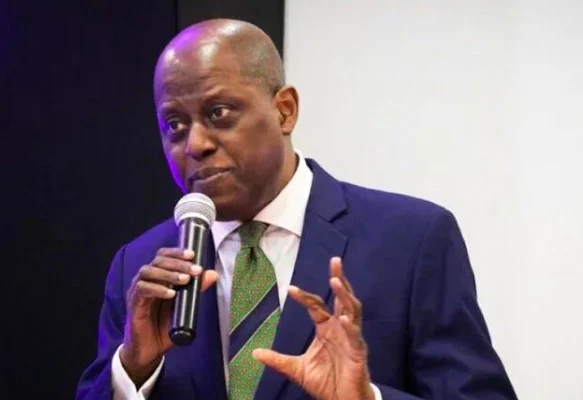The Central Bank of Nigeria (CBN) says it is planning to implement a new round of banking recapitalisation for the Deposit Money Banks (DMBs)
Mr Olayemi Cardoso, the CBN Governor, announced this at the 58th Annual Bankers’ Dinner organised by the Chartered Institute of Bankers of Nigeria (CIBN) on Friday night in Lagos.
The News Agency of Nigeria (NAN) reports that the planned recapitalisation means that DMBs will be required to raise additional capital to meet the demands of Nigeria’s economy.
Cardoso noted that President Bola Ahmed Tinubu in his Policy Advisory Council report on the national economy, had set an ambitious goal of achieving a Gross Domestic Product (GDP) of one trillion dollars by 2030, with clearly defined priority areas and strategies.
According to him, it is important that banks have a role to play in the anticipated one trillion dollars economy by 2030.
Cardoso said going by the huge developmental role the apex bank would want the banks to play in the next seven years, it had become imperative to demand their recapitalisation.
To achieve the target, Cardoso said that Nigeria needed to experience a more rapid and inclusive economic expansion.
“The administration has already commenced this journey through fiscal reforms, including the removal of petrol subsidies and the unification of the foreign exchange market rate.
“Considering the policy imperatives and the projected economic growth, it is crucial for us to evaluate the adequacy of our banking industry to serve the envisioned larger economy.
“It is not just about the stability of the financial system in the present moment, as we have already established that the current assessment shows stability.
“However, we need to ask ourselves: Will Nigerian banks have sufficient capital relative to the financial system’s needs in servicing a $1.0 trillion economy in the near future? In my opinion, the answer is “No!” unless we take action.
“Therefore, we must make difficult decisions regarding capital adequacy. As a first step, we will be directing banks to increase their capital,’’ he said.
The CBN governor also announced the approval of another round of Open Market Operations (OMOs) to mop up excess liquidity from the banking system.
OMOs are the main monetary policy instrument, through which the central bank buys or sells securities with financial institutions in the open markets, thereby influencing the amount of money in circulation and/or interest rates.
Cardoso said, “An OMO auction was recently held with a stop rate of 17.5 per cent for the one-year tenor, attracting oversubscription of N350 billion.
“Another round of OMO has been approved to further reduce excess liquidity.
“Offering N108.1 billion worth of Treasury Bills with three tenors to the investing public, which can help reduce liquidity in the banking system and support government fundraising.’’
Cardoso said the apex bank would use its monetary policy tools to keep inflation low and stable.
He said, “the Central Bank of Nigeria is committed to achieving monetary and price stability. This is not just a technical objective, but it has real-life implications for the well-being of our citizens.
“Through targeted policies, transparent market operations, and coordination between monetary and fiscal authorities, we can ensure a more stable exchange rate, control inflation, and create an enabling environment for businesses and individuals to thrive.’’ READ ALSO:
- Governor Okpebholo Holds Steady Advantage as Edo Election Tribunal Progresses
- FAAC shares N1.424trn December revenue to FG, states, LGs
- Tinubu Commends Nigerian Governors For Supporting Tax Reform
- Tax Reform Bills: Zacch Adedeji, The Man Of Steel
- Breaking The Cycle: How Nigeria’s Economy Shapes Democracy
He noted that the apex bank had taken steps to improve the effectiveness of its monetary policy tools and to strengthen the transmission mechanism so that its policy decisions have a greater impact on the economy
Cardoso added that the ability of the monetary policy committee to influence the economy through its decisions had been weakened because the channels through which monetary policy was transmitted had become disrupted.
The CBN governor said the apex bank was planning to make changes to the country’s foreign exchange regulations by developing new guidelines and legislation.
He stated that banks and foreign exchange operators would be consulted before making any final decisions.(NAN)


